NYC sees record rents, hotel rates as short-term rental law continues
Key Takeaways
- More than 20 months later, New York City's Local Law 18 has failed on its promise of improving housing availability and affordability. For the first time on record, the median rent across all of Manhattan has surpassed $4,000 per month – a 4.1 percent increase since the law took effect – and vacancy rates remain unchanged.
- As short-term rental listings have plummeted, hotel prices have surged. The 12-month average nightly rate for a hotel room in New York City reached a record $320.
- Community and business leaders across the five boroughs are warning that Local Law 18 is hurting, not helping, New Yorkers, urging lawmakers to adopt common-sense updates including allowing hosts to rent their homes while away and lifting strict occupancy limits.
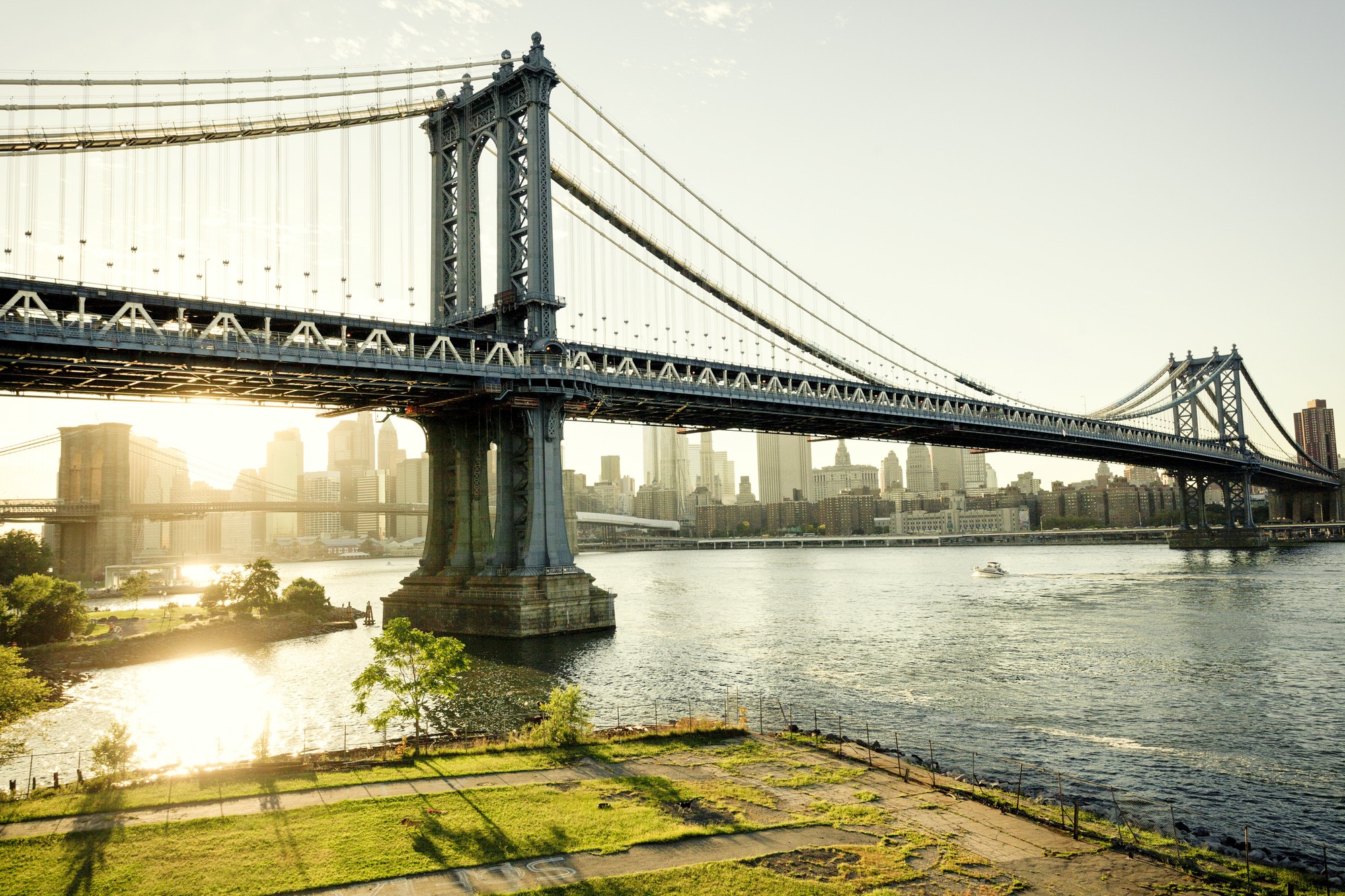
Key Takeaways
- More than 20 months later, New York City's Local Law 18 has failed on its promise of improving housing availability and affordability. For the first time on record, the median rent across all of Manhattan has surpassed $4,000 per month – a 4.1 percent increase since the law took effect – and vacancy rates remain unchanged.
- As short-term rental listings have plummeted, hotel prices have surged. The 12-month average nightly rate for a hotel room in New York City reached a record $320.
- Community and business leaders across the five boroughs are warning that Local Law 18 is hurting, not helping, New Yorkers, urging lawmakers to adopt common-sense updates including allowing hosts to rent their homes while away and lifting strict occupancy limits.
More than 20 months ago, New York City passed Local Law 18 (LL18) with the promise of improving housing availability and affordability. It has failed on that promise. New data shows New Yorkers have experienced the opposite effect: rents have surged – with median Manhattan rents breaking $4,000 for the first time and rent rising more than 4 percent in boroughs like Brooklyn and Queens – while vacancy rates remain unchanged. At the same time, the loss of income for working-class New Yorkers who once hosted short-term rentals has impacted not only their ability to make ends meet, but also small businesses hurt by fewer accommodations and declining visitor spending in their neighborhoods. With a more than 90 percent drop in short-term rentals following LL18, community leaders are now voicing concern that the law is doing more harm than good at a time of growing economic uncertainty.
Manhattan rent breaks $4,000 as housing supply remains stalled
For the first time on record, the median rent across all of Manhattan has surpassed $4,000 per month, according to StreetEasy – a 4.1 percent increase since the law took effect. Citywide, the upward trend continues with rents rising around five percent, including in Brooklyn and Queens, cementing New York City’s place as one of the most expensive cities in the world.
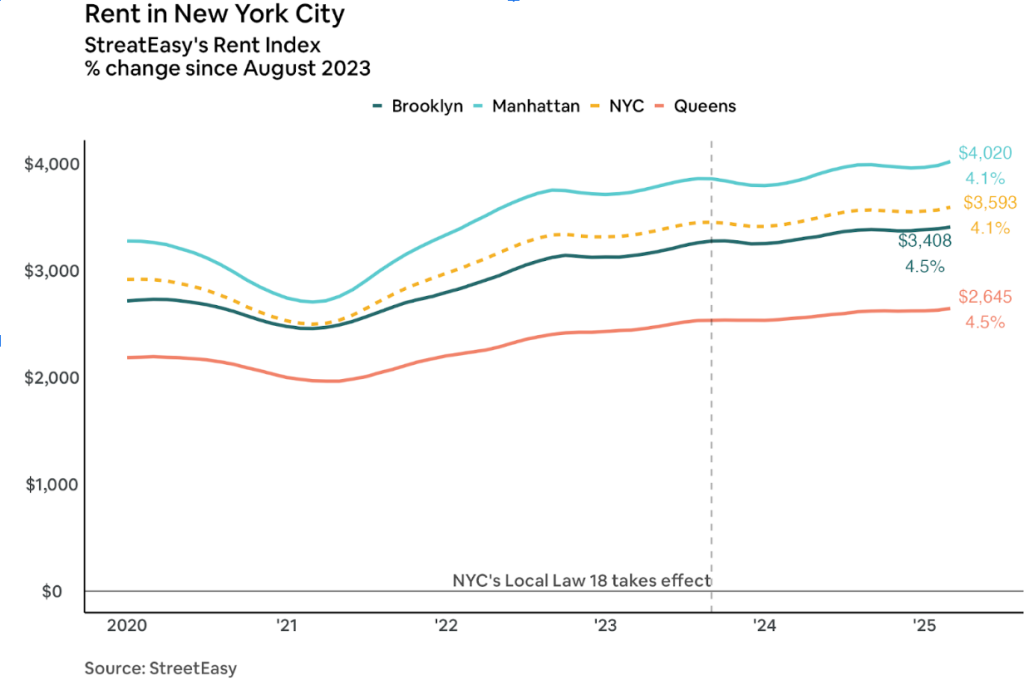
Rent increases in New York also continue to outpace the national average and peer cities like Boston, Chicago, and Washington, D.C.
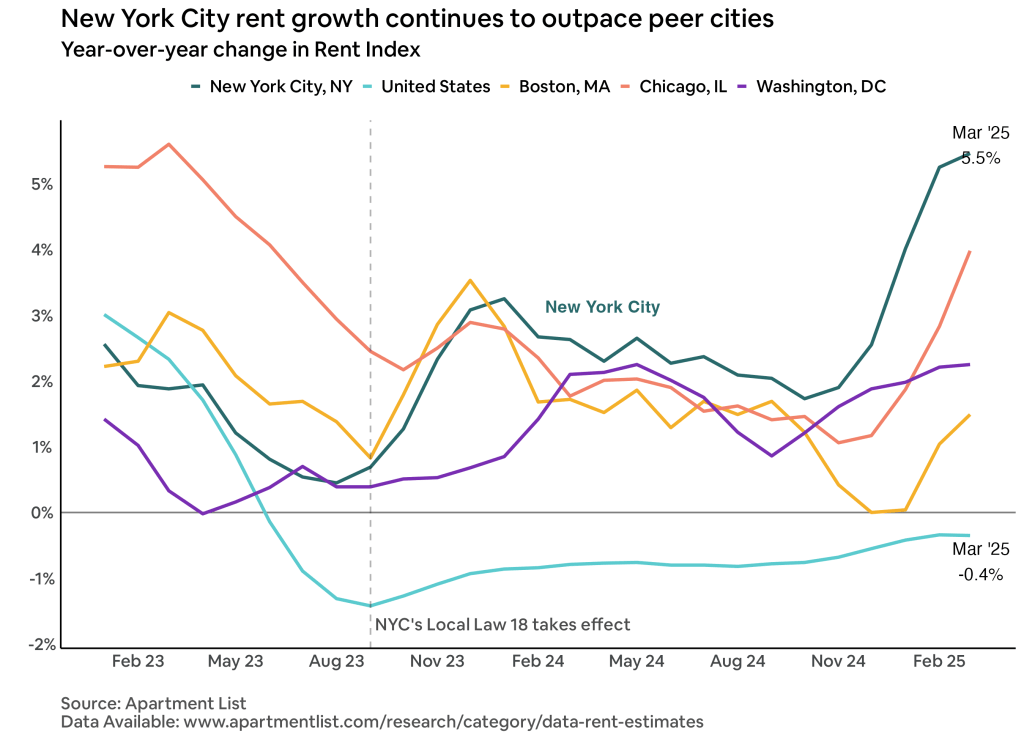
Despite the regulation aimed at freeing up housing, the city’s vacancy rate remains stuck at 3.2 percent – among the lowest in the country and virtually unchanged since the law took effect, according to data from Apartment List and a new report from CoStar. With more renters competing for the same limited supply of homes, affordability remains out of reach for many New Yorkers.
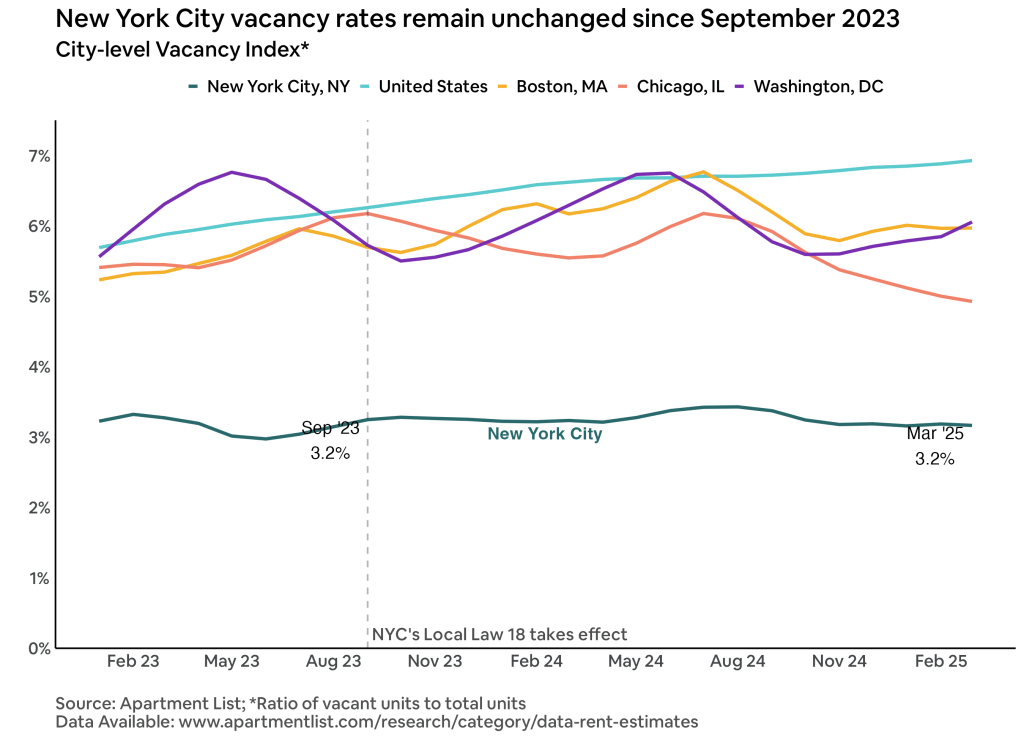
At the same time, the focus on short-term rentals has distracted from the city’s core housing challenge: not enough new supply. CoStar data shows apartment construction starts dropped more than 70 percent in Q1 2025 compared to the city’s 10-year average, marking five consecutive quarterly declines. And while building slows, the city’s population continues to grow.
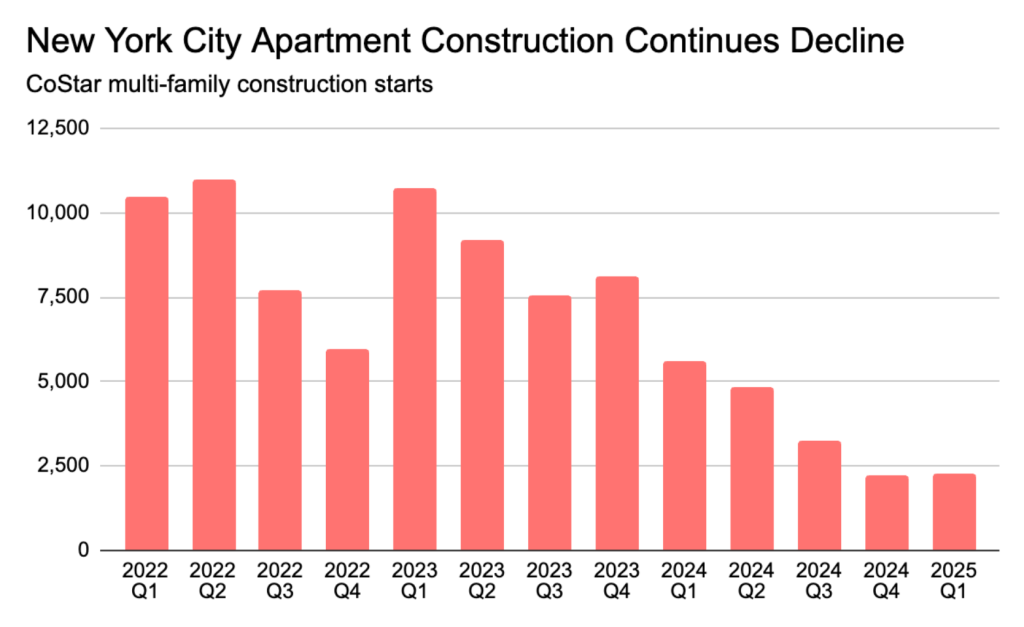
“NYC simply doesn’t have enough homes to meet demand. But instead of building more homes, local families who host have been scapegoated. Not only has this failed to improve the affordable housing crisis, it has cut vital income for thousands of everyday New Yorkers. Whether you’re a local trying to make rent or a visiting family looking for a place to stay, LL18 has undeniably made New York City less affordable for everyone.”
– Nathan Rotman, Policy Director, Airbnb
Hotel rates hit $320 as visitors are funneled to Midtown
As short-term rental listings have plummeted, hotel prices have surged. The 12-month average nightly rate for a hotel room in New York City reached a record $320 – up 5.4 percent year-over-year and more than double the national average, according to CoStar1. Even the head of the NYC hotel lobbying group admits that LL18 may have led to fewer would-be visitors who are able to afford a trip to the city.
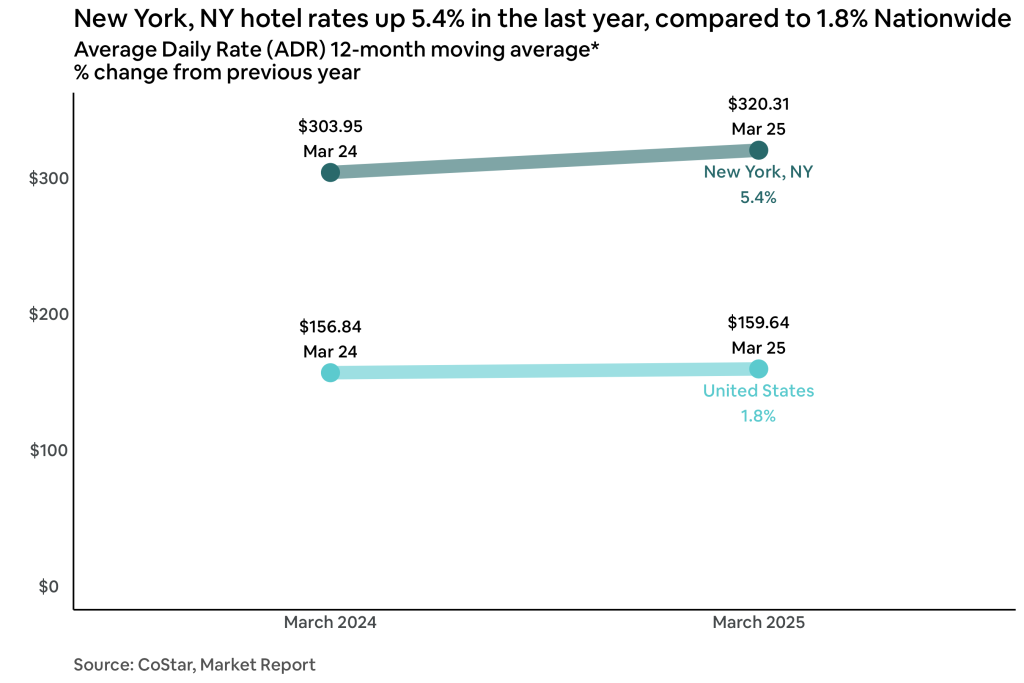
With fewer affordable options, travelers are increasingly clustered in expensive Midtown hotels, where most accommodations are concentrated, or forced to stay outside of the city altogether. Before the short-term rental law, guests stayed across all five boroughs – helping to disperse tourism dollars and foot traffic to neighborhoods throughout the city. Now, community leaders say neighborhoods like Crown Heights, Astoria, and the South Bronx are seeing fewer visitors and less local spending.
The hotel industry’s decade-old playbook to influence housing policy
For more than a decade, big hotel chains have unabashedly been the primary supporters and defenders of the restrictions found in LL18. Under the guise of protecting housing affordability, the hotel lobby’s real motivations are obvious: limiting competition and consolidating the market to benefit themselves rather than everyday New Yorkers and visitors. In New York City, the hotel industry has spent millions lobbying against short-term rentals in the name of protecting housing, while bankrolling the so-called grassroots group “Tenants Not Tourists” which opposes any changes to short-term rental laws.
This pattern isn’t unique to New York. All around the world, in cities from Barcelona to Los Angeles, hotel lobbies have pushed similar restrictions under the banner of housing affordability, all while benefiting from reduced competition and rising hotel average daily rates. Behind the rhetoric is a clear strategy: fund questionable housing studies, create and fund so-called advocacy groups that claim to represent residents, spend millions backing candidates for public office, and influence legislation to reduce competition. The results have been lucrative.
Local organizations sound the alarm
In New York City, community and business leaders across the five boroughs are warning that Local Law 18 is hurting, not helping, New Yorkers, especially in light of a recent report projecting that the outer boroughs could lose up to $1.6 billion in visitor spending.
In a joint letter to the City Council, chambers of commerce from all five boroughs criticized the law’s “overly restrictive” rules as harmful to small businesses, citing up to a 70 percent drop in foot traffic in some neighborhoods. They urged lawmakers to adopt “common-sense updates,” including allowing hosts to rent their homes while away and lifting strict occupancy limits.
Other voices across the city are sounding the alarm:
- The New York Urban League urged the City to reform strict short-term rental rules, which are disproportionately hurting Black and Latino homeowners who rely on the income from sharing their homes to stay in their communities and build generational wealth.
- The Brooklyn Chamber of Commerce has called the law “deeply damaging to our borough’s small businesses and working-class hosts…hurting [Brooklyn’s] residents, small businesses, and local economy.”
- The Dominican American Chamber of Commerce described the policy as “hurting Latino small businesses.”
- The New York State Latino Restaurant Bar & Lounge Association noted that “short-term rental guests often bring our restaurants to life – and their absence is being felt nightly.”
- Chamber of Progress said the law’s impact is clear: “The biggest winner was the hotel industry. Who were the losers? Just about everyone else.”
- Alicia Glen, former NYC Deputy Mayor for Housing, said that she never saw data indicating that short-term rentals were significantly contributing to the housing crisis and that they “opened up travel to hundreds of thousands of people who never would have had the opportunity to come to New York.”
Together, these voices reflect a growing consensus: it’s time for New York City to change its law.
A path forward that puts New Yorkers first
Local Law 18 hasn’t improved housing availability or affordability – but it has driven up prices for residents and visitors, hurt small businesses and local resident hosts, and handed more power to hotels.
A proposed bill offers a positive step forward in making the city more accessible to travelers, without removing a single housing unit from the long-term market. A coalition of likeminded groups and outerborough homeowners continue to push for three modest common-sense changes:
- Increase economic opportunity for New Yorkers: Allowing residents in one- and two-family homes to earn extra income while they’re out of town
- Benefit families: Increasing the number of guests from two to four
- Increase privacy: Allowing homeowners to restrict certain private areas from guest access to increase safety.
“Airbnb supports thoughtful, balanced rules that protect long-term housing and give New Yorkers the ability to responsibly share their homes again so that they can afford to stay in their homes. It’s time for common-sense updates to Local Law 18 so that it works for the city, travelers, and the businesses and residents that rely on tourism spending.”
– Nathan Rotman, Policy Director, Airbnb